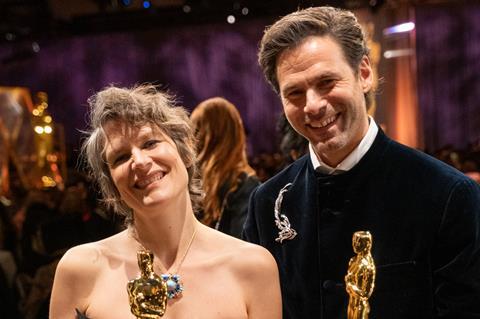
French singer-songwriter Camille and her composer partner Clément Ducol were hired by Jacques Audiard to pen the music and songs for his Mexican musical crime melodrama Emilia Pérez before the script was written. This was back in 2019. But it was only when they saw the finished film at its premiere in Cannes in 2024 that they realised what a phenomenon the movie was going to become. “We got a standing ovation,” says Camille. “I am used to concerts but we got hundreds of professionals acknowledging and applauding the work. It felt like your peers telling you that you did a great job!”
Scoring both Oscar and Golden Globe nominations for Emilia Pérez — and winning the Best Song Globe for El Mal — Camile and Ducol are among the nominees for Film Composer of the Year at the World Soundtrack Awards.
How did the creative relationship with Audiard begin?
Ducol: I received a text message in 2019. Jacques Audiard wanted to do a musical, but he didn’t know if it would be an opera or a movie. We were lucky enough to be involved from the very beginning of the film’s creation, at the writing stage. Jacques wanted us to be part of the script construction.
Where did you do the work?
Ducol: We were in residency in a place in the south-west of France that had a recording studio. In the mornings, we would sit at the table and read the treatment, finding out the scenes that could be used for songs. In the afternoon, we worked on the composition of the music. Then, later in the day, Jacques and his co-scenarist, Thomas Bidegain, would come in and listen. There was a real sense of jubilation because the songs act as a catalyst for emotion and storytelling. [Through the songs], they could throw away pages of script and move more quickly to the next scene. In the evenings, we watched musicals like Hair, Cabaret, West Side Story and Chansons D’Amour and had parties together.
Camille: Jacques is a very adventurous artist. It was like he wanted to go in that jungle and needed companions. It was just the four of us — it felt like we were building that work with our four minds.

How do you two work together?
Camille: It’s true that the core of my work is songwriting. I’m known for being a singer-songwriter. Clement comes from classical contemporary music and orchestration but, before he started working on Emilia Pérez, he had produced pop records. We had already co-composed some songs together — and he had co-composed with other artists and arranged pop and even jazz records. When we started the work, we agreed we would collaborate. We had no pre-set recipe on how it would work. I wrote the lyrics, but when I write lyrics, I write with a melody.
How did you deal with the actors? Were you moulding the songs to fit with them and how did you deal with their different backgrounds and levels of ability?
Camille: Of course, we moulded the songs to the actors, but they have such strong charismas. It was more about how these actors moulded the scenes and songs to their charismas and how they made them their own. Some were musically trained and some weren’t. They have very different voices and ways of working. Zoe Saldana worked in a very different way from Selena Gomez and Karla Sofía Gascón. It was quite a challenge to make it sound like a whole. The main issue when you bring such an eclectic cast together is that it needs to sound like there is a shared vocal direction. [But] it happened naturally. We worked so much together and were all guided by the story. As I am singer, I was also able maybe to communicate to them the way that I heard music.
The rap-rock song El Mal performed by Zoe Saldana and Karla Sofía Gascón was especially praised and won several awards. Was it easy to write?
Ducol: It was very difficult because the subject of the song is so hard. They are talking about very bad and corrupt people, so it was really hard to find the right tone. We composed maybe six different versions. We didn’t know if it would be lyrical or something more bluesy. It ended with this kind of rap opera kind of feel. The power of Zoe’s interpretation gave us the impetus to find the right arrangement. At first, it was more electronic, but when we had Zoe’s interpretation, we were with Camille and Jacques in the studio and we thought we could have a real rock band playing with her.
Camille: That song was really about channelling not only the character’s rage but Jacques’ rage against political hypocrisy. I think that’s why it took such a long time to get to the core of that rage.
Ducol: Jacques was also inspired by Prokofiev, a composition called October Cantata.

























No comments yet